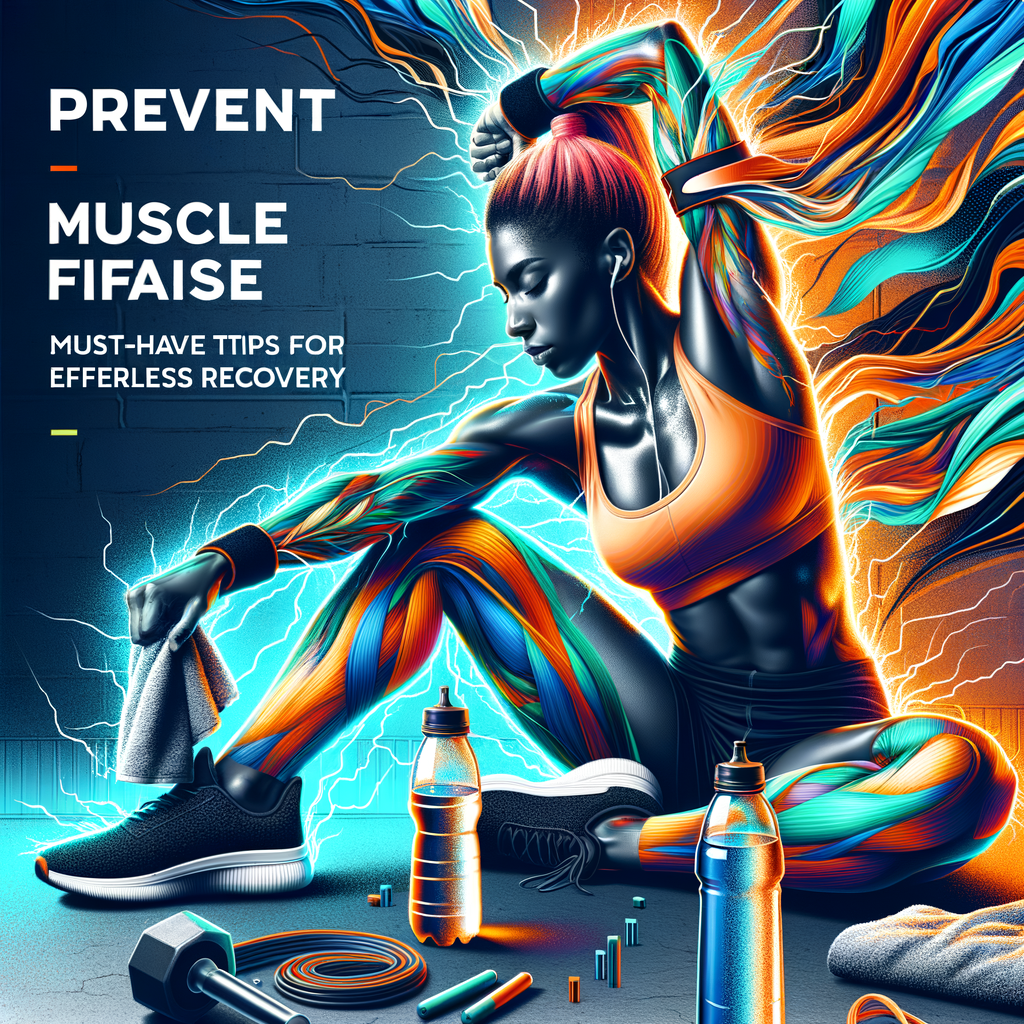- Understanding Muscle Fatigue
- Key Factors Leading to Muscle Fatigue
- 1. Lack of Hydration
- 2. Improper Nutrition
- 3. Inadequate Rest
- Essential Tips for Preventing Muscle Fatigue
- 1. Stay Hydrated
- 2. Optimize Your Nutrition
- 3. Incorporate Stretching and Warm-Up Exercises
- 4. Utilize Active Recovery
- 5. Establish a Consistent Sleep Routine
- 6. Implement Proper Cooling Down Techniques
- 7. Listen to Your Body
- Recovery Tools and Techniques
- 1. Foam Rollers
- 2. Massage Therapy
- 3. Compression Garments
- 4. Ice Baths/Cryotherapy
- Importance of Cross-Training
- Setting Realistic Goals
- Incorporate Mindfulness Practices
- Lifestyle Changes for Better Recovery
- 1. Limit Alcohol Consumption
- 2. Avoid Caffeine Before Bed
- 3. Prioritize Movement Throughout the Day
- The Role of Supplements
- Listening to Expert Opinions
- Conclusion
- Frequently Asked Questions (FAQs)
- 1. How long does it take to recover from muscle fatigue?
- 2. Can I still exercise with mild muscle fatigue?
- 3. What are the signs of severe muscle fatigue?
- 4. How do I know if I’m dehydrated?
- 5. Is stretching really effective for recovery?
- 6. Does diet really impact muscle recovery?
- 7. What are some active recovery exercises?
- 8. How can I improve my sleep quality?
- 9. Is it better to take complete rest days or do active recovery?
- 10. Are there any downsides to using compression garments?
- References
Understanding Muscle Fatigue
Muscle fatigue is a common experience, especially for those who engage in regular physical activities. When your muscles feel tired after a workout, it’s your body signaling that it needs a break and recovery. Preventing muscle fatigue is essential for athletes and anyone who enjoys an active lifestyle. Emphasizing effective recovery strategies keeps you energized and performing at your best.
What causes muscle fatigue? Lactic acid buildup during intense workouts plays a significant role. Additionally, dehydration, inadequate nutrition, and insufficient rest can all lead to fatigue. Understanding these factors can help you take proactive steps to prevent fatigue and ensure your muscles recover efficiently.
Key Factors Leading to Muscle Fatigue
To effectively prevent muscle fatigue, it’s crucial to know its causes. Identifying these factors allows you to tailor your recovery strategies.
1. Lack of Hydration
Our bodies lose fluids through sweat during exercise. If you don’t replenish those fluids, you risk dehydration. Dehydration can lead to muscle cramps and increased fatigue. Always drink enough water before, during, and after your workouts to keep your muscles hydrated and functioning optimally.
2. Improper Nutrition
Nutrition plays a vital role in muscle recovery. If your diet lacks essential nutrients like protein, vitamins, and minerals, your muscles may not recover effectively. Focus on a balanced diet that includes lean proteins, whole grains, fruits, and vegetables to provide your body with the support it needs.
3. Inadequate Rest
Rest is not just a luxury; it’s a necessity. When you skip rest days, your muscles don’t have time to repair and rebuild. Chronic fatigue can result from pushing too hard without allowing recovery. Ensure you incorporate rest days into your routine to give your muscles the time they need.
Essential Tips for Preventing Muscle Fatigue
Adopting effective practices can help you avoid muscle fatigue. Here are some must-have tips for effortless recovery.
1. Stay Hydrated
Hydration is your first line of defense against muscle fatigue. Always keep water at hand. Drink before you feel thirsty, as thirst indicates your body needs fluids. Aim for at least 8-10 glasses per day, and more during heavy workouts. Consider electrolyte drinks if you engage in prolonged or intense exercise.
2. Optimize Your Nutrition
A balanced diet fuels your body and aids recovery. Focus on the following nutrients:
– Proteins: Vital for muscle repair. Include sources like chicken, fish, beans, and nuts.
– Carbohydrates: Provide energy. Opt for whole grains, fruits, and starchy vegetables.
– Fats: Important for overall health. Choose healthy fats from avocados, olive oil, and nuts.
Prepare meals that combine these nutrients for better recovery.
3. Incorporate Stretching and Warm-Up Exercises
Warming up before workouts is crucial. It increases blood flow to your muscles and can reduce the risk of injury. Simple dynamic stretches can effectively prepare your muscles for exercise. After your workout, incorporate static stretches to relax and lengthen your muscles, helping them recover.
4. Utilize Active Recovery
Active recovery refers to low-intensity activities you can do on rest days. Think walking, light cycling, or yoga. These activities increase blood circulation, delivering nutrients to the muscles and speeding up the recovery process.
5. Establish a Consistent Sleep Routine
Sleep is essential for muscle recovery. Aim for 7-9 hours of quality sleep per night. Quality sleep promotes the release of growth hormones that aid muscle repair. Create a bedtime routine to signal your body it’s time to wind down, ensuring better sleep quality.
6. Implement Proper Cooling Down Techniques
Cooling down post-exercise helps your body transition from activity to rest. It lowers your heart rate and promotes gradual recovery. Spend 5-10 minutes doing light exercises or stretches immediately after your workout.
7. Listen to Your Body
Pay attention to what your body tells you. If you feel excessive fatigue or pain, opt for a rest day. Pushing through fatigue can lead to more severe issues like injuries. Remember, rest is part of the workout.
Recovery Tools and Techniques
Using recovery tools can enhance the recovery process. Here are some popular options:
1. Foam Rollers
Foam rolling can alleviate muscle tightness and improve circulation. Spend a few minutes rolling out sore areas before and after workouts.
2. Massage Therapy
Consider regular massages to reduce muscle tension and enhance recovery. Massage therapists can target problem areas and improve circulation.
3. Compression Garments
Wearing compression clothing may help reduce swelling and muscle soreness. Many athletes find them beneficial during both exercise and recovery phases.
4. Ice Baths/Cryotherapy
Cold therapy can reduce inflammation and speed up recovery. While it may feel uncomfortable, many athletes swear by its effectiveness for reducing muscle soreness after intense workouts.
Importance of Cross-Training
Engaging in different types of exercise helps reduce the risk of overuse injuries. Cross-training allows you to work different muscle groups while giving some a break. Mix your workouts instead of sticking to one type of exercise. This variation can keep your routine enjoyable and engaging.
Setting Realistic Goals
Setting realistic fitness goals can prevent overtraining. It’s easy to get carried away but listening to your body is crucial. Structure your progress over time rather than aiming for immediate results. Set short-term goals that gradually lead to long-term success.
Incorporate Mindfulness Practices
Stress can significantly affect recovery. Mindfulness practices such as meditation, yoga, or deep breathing can reduce stress levels. Lower stress can improve overall well-being and enhance recovery rates.
Lifestyle Changes for Better Recovery
Simply adjusting your daily routine can lead to better muscle recovery. Here are a few lifestyle changes to consider:
1. Limit Alcohol Consumption
Excessive alcohol can impede muscle recovery. It dehydrates your body and disrupts sleep patterns. If you drink, do so in moderation.
2. Avoid Caffeine Before Bed
While moderate caffeine can boost performance, consuming it too close to bedtime can disrupt your sleep. Opt for caffeine-free beverages in the evening to promote a restful night.
3. Prioritize Movement Throughout the Day
Staying active during the day can reduce muscle tightness. Take short walks or stretch regularly, especially if you sit for long periods. Keeping your body in motion aids recovery.
The Role of Supplements
Some supplements can aid recovery and help prevent muscle fatigue. Here are a few to consider:
– Protein Supplements: Help repair muscle after workouts.
– BCAAs: May reduce muscle soreness and promote recovery.
– Magnesium: Supports muscle function and relaxation.
Always consult with a healthcare provider before starting new supplements.
Listening to Expert Opinions
Experts recommend regular check-ups to monitor your health and fitness progress. A trainer can provide insights into your routine and help tailor a program for optimal results.
Conclusion
Preventing muscle fatigue requires a holistic approach. By focusing on hydration, nutrition, rest, and overall lifestyle choices, you can ensure effective recovery. Incorporate the tips outlined above to stay energized and ready for your next workout. Remember, recovery is just as essential as the workout itself.
Frequently Asked Questions (FAQs)
1. How long does it take to recover from muscle fatigue?
Recovery can vary from a few hours to several days, depending on intensity and individual health conditions.
2. Can I still exercise with mild muscle fatigue?
Yes, but opt for low-impact workouts or active recovery to avoid further strain.
3. What are the signs of severe muscle fatigue?
Signs include excessive soreness, persistent fatigue, and difficulty performing daily activities.
4. How do I know if I’m dehydrated?
Signs of dehydration include dark urine, fatigue, and dry mouth. Drink water consistently to maintain hydration.
5. Is stretching really effective for recovery?
Yes, stretching helps improve flexibility, promotes relaxation, and decreases muscle soreness.
6. Does diet really impact muscle recovery?
Absolutely, a well-balanced diet supplies essential nutrients that support muscle repair and growth.
7. What are some active recovery exercises?
Walking, swimming, and gentle yoga are excellent active recovery options.
8. How can I improve my sleep quality?
Establish a bedtime routine, limit screen time before bed, and keep your sleeping environment comfortable.
9. Is it better to take complete rest days or do active recovery?
Incorporating both is ideal. Mixing complete rest with active recovery can optimize results.
10. Are there any downsides to using compression garments?
While generally safe, ensure they fit correctly. Overly tight garments may restrict circulation.
References
– Mayo Clinic: Muscle Fatigue
– American Council on Exercise: Fitness and Recovery
– National Institute of Health: Hydration and Muscle Performance
– WebMD: Nutrition for Muscle Recovery
– Healthline: Sleep and Recovery



